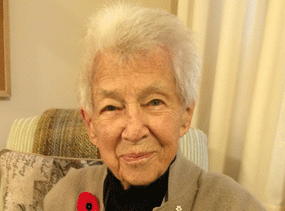Dr. Verna Huffman Splane, a giant in Canadian nursing and health care, celebrated her 100th birthday in November. Splane graduated from U of T in 1939, and went on to have an illustrious career, working extensively with the World Health Organization and conducting the largest-ever study of senior nursing positions in more than 50 countries with her husband, Richard, one of the architects of Canada’s social welfare system. She received an honorary doctorate from U of T in 2007.
Splane received a Diploma in Public Health Nursing in 1939. “I attended U of T with the assistance of the Victorian Order of Nurses (VON), which committed me to the next two years of service,” Splane said. “We were caught up in the declaration of the Second World War, concerned for our country and whether we were going to sign up for military service, or going ahead with what we had been preparing for. It was a time of uneasiness about the future, but in general, the nursing profession was ready to serve.”
Splane’s conviction that nurses should be taught they are part of a global profession led her to begin work with the WHO in 1959. “We know that what happens in the health field in one country has a potential effect on other countries, and I learned much in the WHO to support that conviction. Canadian nurses already have a distinguished record of working with the WHO and the International Council of Nurses,” said Splane. “We should continue to prepare nurses to serve wherever the need is—at home or abroad.”
On retiring in 1985, Richard asked her “What are you going to do now?” She decided to follow-up on some of the work begun with the WHO, urging the promotion of a senior nursing position in governments to be involved in the shaping of national health-care policies. Richard, himself a renowned scholar in social policy and research, offered to help. Thus began the largest study of senior nursing positions in more than 50 countries, the results of which are still used as a basis for WHO assistance in forming nurse leader roles in developing countries.
With more than 70 years of nursing under her belt, Splane watched as nursing roles changed in Canada. “In my view, the fundamental change that led to many others was the movement of nursing education from hospital schools to the public system of education—the university—as outlined in the Weir Report in the 1930s. That transition and the introduction of the national health insurance system in Canada have opened doors for nurses into areas of leadership previously unknown, nationally and internationally. The 20th century was a demanding and exciting time for nurses exploring new paths of service and professional relationships.”
“I think nursing has a great future,” Splane continues. “The quality of education available to nurses today with strong international leadership, the constant demographic changes of this new century, the public pressure for changes to the health-care system, new inter-professional research activities in government and universities, and the maturing of the organized nursing profession itself—all of these things speak to an open door to the future for nursing never before possible.”
And after those 70 years in the profession, Splane had this advice for graduating classes: “Embrace change. Sustain engagement in community development in its broadest sense. Add continuously to your unique educational skills and knowledge in applying fresh enthusiasm and bright young ideas to shape a better world in your century. From my experience, it may be hard work but it can be fun!”
With files from Pulse Magazine and the Archives of the Governor General of Canada
